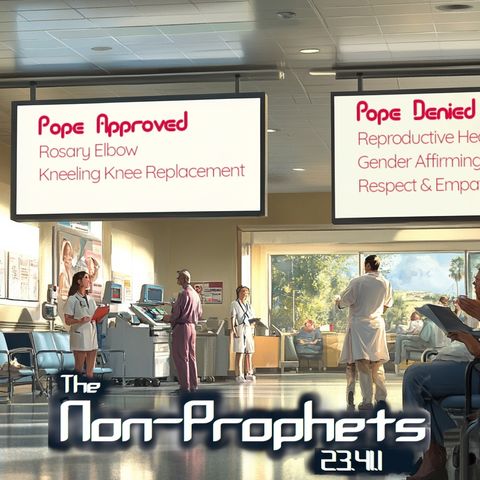Colorado Orders Catholic Hospitals to List Banned Services

Descarga y escucha en cualquier lugar
Descarga tus episodios favoritos y disfrútalos, ¡dondequiera que estés! Regístrate o inicia sesión ahora para acceder a la escucha sin conexión.
Colorado Orders Catholic Hospitals to List Banned Services
Esta transcripción es generada automáticamente. Ten en cuenta que no se garantiza una precisión absoluta.
Descripción
Colorado will now make Catholic hospitals say what services they won't provideThe Friendly Atheist, By Hemant Mehta, on October 1, 2024 https://www.friendlyatheist.com/p/colorado-will-now-make-catholic-hospitals?utm_source=share&utm_medium=android&r=oa4eg&triedRedirect=true Colorado has passed a new law requiring all...
mostra másBy Hemant Mehta, on October 1, 2024
https://www.friendlyatheist.com/p/colorado-will-now-make-catholic-hospitals
Colorado has passed a new law requiring all hospitals to disclose any procedures they won’t perform due to non-medical reasons. The "Patients Right to Know Act" ensures transparency, especially targeting Catholic hospitals that follow religious doctrine rather than medical expertise in determining the services they offer. Many Catholic hospitals, instead of being clear about their religious affiliations, use generic names like “Mercy Hospital,” hiding their policies from the public. This legislation aims to solve that, allowing patients to make informed decisions about their healthcare based on the services the hospitals offer or refuse. Catholic hospitals, governed by the United States Conference of Catholic Bishops, refuse to provide services like abortions, sterilizations, and gender-affirming care, as they are considered to violate Catholic doctrine. These policies put patients, particularly women and transgender individuals, at risk when seeking crucial medical treatments. The new law will require such hospitals to list non-medical reasons for refusing procedures on a state website. However, hospitals are not required to display this information on their own websites, creating a loophole. Many patients may not check the state site, and by the time they realize a procedure isn’t available, it could be too late, especially in emergency situations. The controversy centers on whether religious hospitals should be able to refuse care based on faith when operating as medical institutions. Many argue that religious beliefs should not influence healthcare decisions, which should be grounded in medical science and patient needs. It is raised that if organizations choose to provide healthcare, they should abide by the standards of the medical profession, not their religious dogma. This concern has been illustrated with hypothetical comparisons: it’s like a church-run car dealership deciding not to install steering wheels because they believe “Jesus takes the wheel.” This is especially relevant in rural areas, where Catholic hospitals may be the only available option. Here, patients are left with no alternative care options, and doctors working in these hospitals might not be allowed to perform certain procedures even if they personally want to, limiting their experience and growth as medical professionals. Lastly, while some think this law may encourage alternative healthcare providers to fill in the gaps left by religious hospitals in rural areas, others are skeptical that this would happen on a significant scale. The Catholic Church, with its influence and deep financial resources, is unlikely to reconsider its policies, leaving patients vulnerable unless further reforms are introduced. Colorado will now make Catholic hospitals say what services they won't provide.
The Non-Prophets, Episode 23.41.1 featuring Infidel64, Stephen Harder , Aaron Jensen, and AJ.
Información
| Autor | Atheist Community of Austin |
| Organización | Atheist Community of Austin |
| Página web | - |
| Etiquetas |
Copyright 2024 - Spreaker Inc. an iHeartMedia Company
